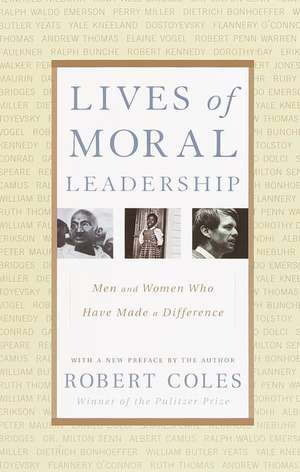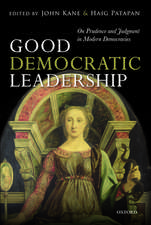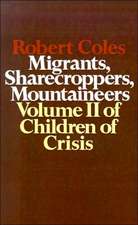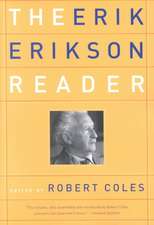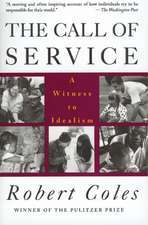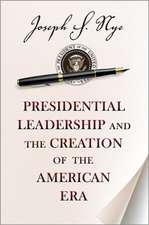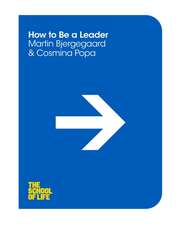Lives of Moral Leadership: Men and Women Who Have Made a Difference
Autor Robert Colesen Limba Engleză Paperback – 30 sep 2001
Coles tells how to be a moral leader and shows how the intervention of one person can change the course of history, as well as influence the day-to-day quality of life in our homes, schools, communities, and nation. We need to "hand one another along" in life, says Coles, quoting his friend Walker Percy, and in Lives of Moral Leadership he explores how each of us can be engaged in a continual and mutual life-giving process of personal and national leadership development. Coles discusses how the actions of the American president affect the way people feel about themselves and the country, and-citing the influence of Shakespeare's Henry V on Robert Kennedy, and of Tolstoy's Anna Karenina on his own mother--explains how reading literature can motivate action and growth. The way in which moral leaders emerge today, and for all time, comes vividly to light in this brilliant book by one of America's finest teachers and writers.
From the Hardcover edition.
Preț: 109.54 lei
Nou
Puncte Express: 164
Preț estimativ în valută:
20.96€ • 21.80$ • 17.31£
20.96€ • 21.80$ • 17.31£
Carte disponibilă
Livrare economică 24 martie-07 aprilie
Preluare comenzi: 021 569.72.76
Specificații
ISBN-13: 9780375758355
ISBN-10: 0375758356
Pagini: 272
Dimensiuni: 130 x 203 x 15 mm
Greutate: 0.3 kg
Ediția:Trade Paperback.
Editura: Random House Trade
ISBN-10: 0375758356
Pagini: 272
Dimensiuni: 130 x 203 x 15 mm
Greutate: 0.3 kg
Ediția:Trade Paperback.
Editura: Random House Trade
Notă biografică
Robert Coles is a professor of psychiatry and medical humanities at the Harvard Medical School and a research psychiatrist for the Harvard University Health Services. His many books include the Pulitzer Prize-winning five-volume Children of Crisis and the bestselling The Moral Intelligence of Children and The Spiritual Intelligence of Children. He is also the James Agee Professor of Social Ethics at Harvard. He lives in Massachusetts.
From the Hardcover edition.
From the Hardcover edition.
Extras
The pages ahead are meant to tell of moral leaders I have known, and of moral leadership of various kinds as it has figured in particular lives--leadership exerted by individuals well-known and influential, and also by ordinary folks, people young and old who have responded with moral energy to a crisis or challenge in a way that has meant a lot to others.
I hope through these accounts of moral leadership to show how each of us plays a role in the moral drama of the world around us, and show by implication how we can play an even greater one, at one time or another, in the course of our lives.
We need heroes, people who can inspire us, help shape us morally, spur us on to purposeful action--and from time to time we are called on to be those heroes, leaders for others, either in a small, day-to-day way, or on the world's larger stage. At this time in America, and in the rest of the world, we seem to need moral leadership especially, but the need for moral inspiration is ever present.
Over the years I have tried to understand the development of moral understanding in children: how character is shaped and young people are led to develop moral awareness. Here I want to address the moral life of adults, as it, too, gets shaped by and in turn shapes others, a continual and mutual process: the moral leadership we provide or are inspired by in public life, in schools and universities, in our cultural, civic, and religious lives, in our homes, and at critical moments in our personal life, when (to draw upon Walker Percy's phrase at the end of The Moviegoer) "we hand one another along."
Moral Witnesses
I summon here as moral witnesses certain individuals I've been lucky to know, and I mean for the stories I tell to be representative of moral leadership, even as I try to talk about the qualities that make for it. I attempt here to describe those people, and to render what I have observed and tape-recorded and remembered about them. Some of the men and women in this book are well known (Robert Kennedy, Dorothy Day), others are less familiar to most readers, still others are ordinary folks, or people known only to their students (teachers such as Werner Jaeger and Perry Miller) or readers. I call upon my work, take up the much-neglected matter of "moral psychology" through the example of Erik Erikson's reflections on the actions of a Boston bus driver. I also call upon a moral tradition as I have learned it and heard it translated by teachers in elementary schools and universities. The truth is that, complain as we might about the absence of moral behavior in life today, we have to work to advance it. We need to hand one another along through the moral leadership we show, or through how we support it in others.
I also want this book to show how literature can be a living moral catalyst and presence for many people, for a leader such as Dorothy Day, who constantly turned to Tolstoy or Dostoyevsky, and for Robert Kennedy, who found enlightenment in one of Shakespeare's characters, Henry V. In that spirit I try to connect these and other moral leaders to certain morally awake writers, such as Ralph Waldo Emerson and Joseph Conrad.
The book starts with my first meeting with Robert Kennedy, in 1965, when I was thirty-five years old. I had testified before the Senate Ribicoff Committee, which was looking into the racial problems of urban America; Robert Kennedy, a senator from New York at that time, talked with me at some length. Soon thereafter, I accompanied him on some of his field trips to the Mississippi Delta, to Appalachia, where I'd also worked. Early on he asked me this: "How did you get to where you are in life?" This book is in part an answer to that question. The upshot of Kennedy's query was a long moral conversation on both our parts--and in a way, that encounter, and his pointed, searching question with its obvious personal meaning for him at that moment in his own life, set the thematic tone for this book as well: the how, the why, the whither of our introspective journeys as men and women, as citizens, and as teachers of one another as we, all of our lives (no matter our stations or situations), hand one another along morally--the moral connectedness that matters so much in our minds and hearts.
No wonder, then, I write about Yale Kneeland, a great physician teacher of mine at medical school, his dignity and decency a big example for us, who watched him so closely; and I recall a class I audited at Union Theological Seminary while a medical student, the teacher, Reinhold Niebuhr, telling us what it meant to him to know Dietrich Bonhoeffer--indeed a teacher inspiring us morally even as he was inspired by Bonhoeffer's resistance to Hitler. I write, too, about ordinary people who became heroes of mine--their ethical strength a stirring witness for the regions in which they lived.
From the Hardcover edition.
I hope through these accounts of moral leadership to show how each of us plays a role in the moral drama of the world around us, and show by implication how we can play an even greater one, at one time or another, in the course of our lives.
We need heroes, people who can inspire us, help shape us morally, spur us on to purposeful action--and from time to time we are called on to be those heroes, leaders for others, either in a small, day-to-day way, or on the world's larger stage. At this time in America, and in the rest of the world, we seem to need moral leadership especially, but the need for moral inspiration is ever present.
Over the years I have tried to understand the development of moral understanding in children: how character is shaped and young people are led to develop moral awareness. Here I want to address the moral life of adults, as it, too, gets shaped by and in turn shapes others, a continual and mutual process: the moral leadership we provide or are inspired by in public life, in schools and universities, in our cultural, civic, and religious lives, in our homes, and at critical moments in our personal life, when (to draw upon Walker Percy's phrase at the end of The Moviegoer) "we hand one another along."
Moral Witnesses
I summon here as moral witnesses certain individuals I've been lucky to know, and I mean for the stories I tell to be representative of moral leadership, even as I try to talk about the qualities that make for it. I attempt here to describe those people, and to render what I have observed and tape-recorded and remembered about them. Some of the men and women in this book are well known (Robert Kennedy, Dorothy Day), others are less familiar to most readers, still others are ordinary folks, or people known only to their students (teachers such as Werner Jaeger and Perry Miller) or readers. I call upon my work, take up the much-neglected matter of "moral psychology" through the example of Erik Erikson's reflections on the actions of a Boston bus driver. I also call upon a moral tradition as I have learned it and heard it translated by teachers in elementary schools and universities. The truth is that, complain as we might about the absence of moral behavior in life today, we have to work to advance it. We need to hand one another along through the moral leadership we show, or through how we support it in others.
I also want this book to show how literature can be a living moral catalyst and presence for many people, for a leader such as Dorothy Day, who constantly turned to Tolstoy or Dostoyevsky, and for Robert Kennedy, who found enlightenment in one of Shakespeare's characters, Henry V. In that spirit I try to connect these and other moral leaders to certain morally awake writers, such as Ralph Waldo Emerson and Joseph Conrad.
The book starts with my first meeting with Robert Kennedy, in 1965, when I was thirty-five years old. I had testified before the Senate Ribicoff Committee, which was looking into the racial problems of urban America; Robert Kennedy, a senator from New York at that time, talked with me at some length. Soon thereafter, I accompanied him on some of his field trips to the Mississippi Delta, to Appalachia, where I'd also worked. Early on he asked me this: "How did you get to where you are in life?" This book is in part an answer to that question. The upshot of Kennedy's query was a long moral conversation on both our parts--and in a way, that encounter, and his pointed, searching question with its obvious personal meaning for him at that moment in his own life, set the thematic tone for this book as well: the how, the why, the whither of our introspective journeys as men and women, as citizens, and as teachers of one another as we, all of our lives (no matter our stations or situations), hand one another along morally--the moral connectedness that matters so much in our minds and hearts.
No wonder, then, I write about Yale Kneeland, a great physician teacher of mine at medical school, his dignity and decency a big example for us, who watched him so closely; and I recall a class I audited at Union Theological Seminary while a medical student, the teacher, Reinhold Niebuhr, telling us what it meant to him to know Dietrich Bonhoeffer--indeed a teacher inspiring us morally even as he was inspired by Bonhoeffer's resistance to Hitler. I write, too, about ordinary people who became heroes of mine--their ethical strength a stirring witness for the regions in which they lived.
From the Hardcover edition.
Recenzii
Praise for Robert Coles
"Robert Coles should be declared a national treasure."
-- The Washington Post Book World
"An important, illuminating book."
-- The New York Times Book Review, about The Moral Intelligence of Children
"Robert Coles . . . has told us more about the diverse and complex lives of children than any other scholar of his generation."
-- Alvin P. Sanoff, U.S. News & World Report, about The Spiritual Life of Children
"A timely, perhaps even timeless, summons to examine the question of moral example and rectitude."
-- Kirkus Reviews, about Lives of Moral Leadership
From the Hardcover edition.
"Robert Coles should be declared a national treasure."
-- The Washington Post Book World
"An important, illuminating book."
-- The New York Times Book Review, about The Moral Intelligence of Children
"Robert Coles . . . has told us more about the diverse and complex lives of children than any other scholar of his generation."
-- Alvin P. Sanoff, U.S. News & World Report, about The Spiritual Life of Children
"A timely, perhaps even timeless, summons to examine the question of moral example and rectitude."
-- Kirkus Reviews, about Lives of Moral Leadership
From the Hardcover edition.
Descriere
Drawing on the rich experiences of his own life, Coles gives a powerful account of the impact moral leaders and ordinary citizens have to show how people are all called on to become moral leaders at times, in their own homes, schools, and communities, and in the nation.
